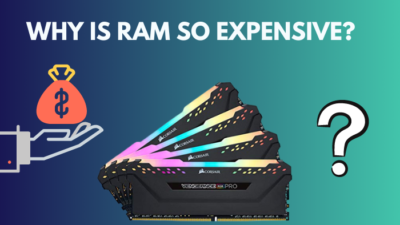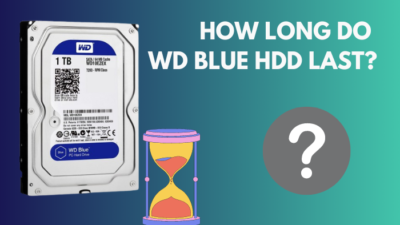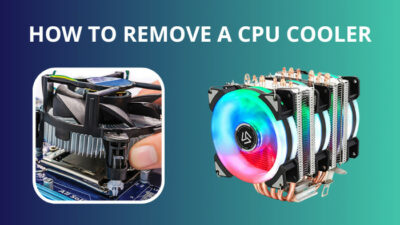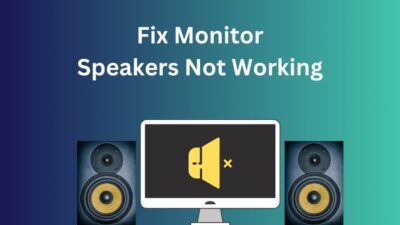The history of computing date back to April 1936 – June 1939, in the IBM Patent Department, by Arthur Halsey Dickinson. In modern times, the process of computing and hardware has improved a lot.
Different types of processors are available in the market, including single-core, dual-core, quad-core, and so on. Nowadays, we can find the most advanced computer available for consumers with a maximum number of 64-cores.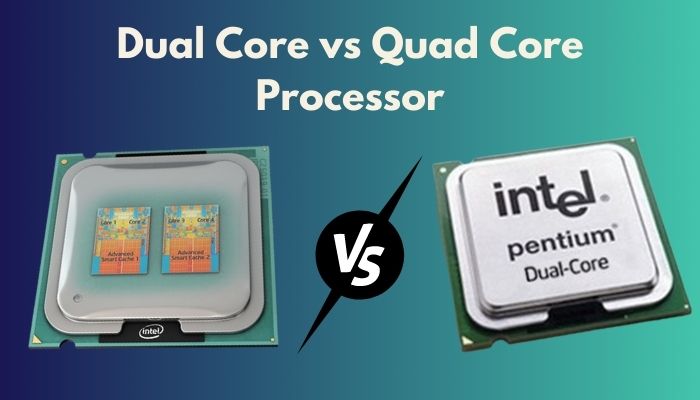
This article will show you a clear picture of both dual-core and quad-core processors. After completing the entire article, you can decide for yourself which one is more suitable for your daily need.
Without further discussion, let’s dive into this well-researched article to learn all the valuable information and compare dual-core and quad-core processors.
What is Dual Core & Quad Core?
A core is a small CPU that is a part of a big CPU or CPU socket. A single core can perform all the computational tasks independently. We can consider a single core, like a small CPU that can handle functions as a part of a big processor.
Quick Note: The first ever single-core processor was Intel 4004, which was released on November 15, 1971. The speed of the Intel 4004 was 740kHz.
Nowadays, different types of processors are available for consumers, including single-core, dual-core, quad-core, Hexa-core, octa-core, and so on. An 18-core processor is also available for consumers.
The maximum number of cores you will find for a consumer in the market is a 64-core AMD Threadripper. However, this is too powerful CUP for most day-to-day computer users.
Dual Core
A dual-core processor is a central processing unit with two individual cores. Each core has it’s own controllers that allow dual-core CPU to perform more efficiently.
Dual-core processors can perform better and faster than single-core processors, using two individual cores to complete the tasks.
When you need to run more than one task simultaneously, dual-core processors can divide the tasks between two processors to boost performance.
Dula-core processors use less power and higher clock speed compared to multi-core processors. The only drawback of a dual-core processor is that a single-core processor can outrun it with the clock speed of the processor.
Quad Core
A quad-core processor is a central processing unit with four individual cores. Like the dual-core processors, it has it’s own controllers that allow four cores to perform faster.
As it has more cores, it can perform multiple tasks simultaneously without increasing the base clock speed.
The drawback of using a quad-core processor is it uses more power to operate than dual-core processors.
A single core can hold up to 8 MB cache. With a quad-core processor, it can do tasks faster with cache support.
Differences Between Dual-Core and Quad-Core
The main difference between dual-core and quad-core processors are the dual-core processor uses two individual cores for computing which is power efficient and budget-friendly.
On the other hand, a quad-core processor uses four cores which is power hungry and useful for heavy multitasking.
There are also some other differences between a dual-core and quad-core processor. Go through the below list to find out more differences.
- A dual-core processor consists of two individual cores that can perform different tasks simultaneously. The quad-core processor consists of four individual cores, which is fast and convenient.
- Dual-core processors are not fast enough as they use only two cores to perform multiple tasks at once. Quad-core processors are faster than dual-core as they can handle several programs simultaneously.
- Dual-core processors use less power to perform the tasks, which helps to handle heating issues more effectively. As there are multiple cores in a quad-core processor, it uses more energy and heats the device quickly.
- A dual-core processor can not handle multiple tasks efficiently because it has only two cores. On the other hand, a quad-core processor can handle multiple tasks without dropping the performance.
- Dual-core processors can’t easily handle heavy graphical programs, so you may need to use an extra GPU for better visual output. Quad-core processors are graphically acceptable as it has four different cores to handle graphics effortlessly.
Though there are differences between dual-core and quad-core processors, it is hard to determine which is more suitable for you. Depending on your uses, you can choose the best processor for you. We will talk about it in the below sections.
Comparison Table Between Dual-Core and Quad-Core
To better understand the differences between dual-core and quad-core processors, pass through the below comparison table in tabular form.
| Parameter of Comparison | Dual-Core | Quad-Core |
|---|---|---|
| Number of Cores | 2 Cores. | 4 Cores. |
| Processing Speed | Not fast enough. | High-speed processing. |
| Power Efficiency | Uses less power. | Consume more power. |
| Multi Tasking | Can’t perform many tasks at once. | Can perform several tasks at once. |
| Heating Issue | Do not heat the device. | Have serious heating issues. |
| Graphics Quality | Poor graphics quality. | High-quality graphics. |
The above table shows all the necessary information about dual-core and quad-core processors. It has a clear visual representation of the comparison between the two types of processors.
However, this data indicates only the primary factors and information. To find out which is better for you in real life, I suggest you read the below information.
What is Better: Quad-Core or Dual-Core?
While talking about dual-core and quad-core processors, it is evident that we need to know which one is better. The simple answer is not simple.
A dual-core uses two cores, and a quad-core uses four cores for performing computational tasks. So without hesitation, we can say that a quad-core processor will perform faster than a dual-core processor.
But a dual-core processor uses a faster clock speed to process a single task more efficiently. It also uses less energy than a quad-core processor, which is convenient.
If multitasking is your daily routine, you should get a quad-core processor without hesitation. A multi-core processor can handle numerous programs simultaneously, boosting your productivity.
So, to choose from a dual-core or quad-core processor, understand the user’s need and then go for the most suitable one.
Where Do More Cores Really Help?
More cores can perform better than fewer cores. Now let’s focus on the topic where more cores actually help. Most users don’t need more cores for their day-to-day tasks. Then where it really helps? More cores help in gaming, video & sound editing, and graphics-intensive tasks.
You may need more cores to play games smoothly if you are a gamer. Most modern games support multi-threaded architecture. Though video games depend on GPU for graphical output, having multi-cores help too.
For the people who work on video or audio editing, having multi-core can be handy to manage large projects. Nowadays, the most popular audio & video editing tools can take advantage of multi-core CPUs.
If you are a digital artist, you must use essential photo editing tools like Photoshop. For a designer, a higher clock speed and more processor cache are needed rather than multiple cores.
Frequently Asked Questions
Does quad-core mean 4 processors?
A quad-core processor has four different cores embedded within a single processor dye. The cores can divide the tasks within the cores for faster output.
How many core CPUs do I need?
For most computer users, two core CPU is enough for handling daily tasks. If your computer face slow-down issues, you may need to update the RAM for better performance.
Why is a dual-core processor better?
A dual-core processor is better for it’s power efficiency and handling ability of single-thread programs. It also can handle multiple tasks simultaneously.
Final Thoughts
If you are going to buy a new computer, it will be wise not to focus on the number of cores in the processors but instead focus on your need and set up a suitable device for you.
When buying a computer, choose all the perfect hardware, including a good RAM, hard drive and GPU. That will provide you with a satisfying performance.
This article has covered all the topics to decide which processor will be best for you depending on user behavior.
Do you have any additional queries regarding this issue? Leave a comment below for further assistance.
